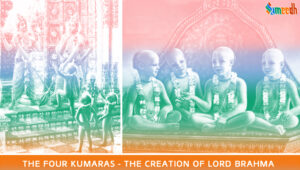The Four Kumaras, also known as the Chatur Sanatana Kumara, are four sages who are regarded as the mind-born sons of Lord Brahma, the creator in Hindu cosmology.

The Four Kumaras, the mind-born sons of Lord Brahma in Hindu mythology, are collectively known by the following names:
- Sanaka Kumar: The eldest among the Four Kumaras.
- Sanandana Kumar: The second in line.
- Sanatana Kumar: The third brother.
- Sanat Kumar: The youngest among the Four Kumaras
The story of their birth is often recounted in various Purans, and it goes as follows:
Once, Lord Brahma, the creator of the universe, desired to continue the process of creation. However, his consort, Saraswati, was not present at that moment. Filled with the desire to create, Brahma produced four sons directly from his mind (manas). These sons were born as fully grown and enlightened beings, possessing immense wisdom and spiritual knowledge.
The Four Kumaras—Sanaka, Sanandana, Sanatana, and Sanat—were not bound by the conventional stages of infancy, childhood, and youth. Instead, they emerged as mature and eternal beings with an inherent understanding of spiritual truths. Due to their unique birth, they are sometimes referred to as the “mind-born sons” or “manasputras” of Lord Brahma.
These Kumaras are known for their celibacy, renunciation, and dedication to spiritual knowledge. They are often depicted as eternal youths, symbolizing the perpetuity of their wisdom and enlightenment.
These Kumaras are often referred to as the Chatur Sanatana Kumara, emphasizing their eternal and youthful nature. They are renowned for their wisdom, ascetic lifestyle, and dedication to spiritual knowledge. The stories and teachings associated with the Four Kumaras are found in various Purans and other Hindu scriptures.
The Kumaras are said to be eternal and remain perpetually youthful due to their ascetic and celibate lifestyle. The Four Kumaras are described as exceptionally handsome and enlightened beings. They are often depicted as young, beardless sages with a serene and peaceful demeanor.
The Kumaras are known for their renunciation and wisdom. They are considered Jnanis (wise beings) who follow the path of knowledge and spiritual insight. Due to their devotion to Lord Vishnu, they are also sometimes associated with the Vaishnavism tradition.
In one notable story found in various Purans, including the Narad Puran and the Bhagavad Puran, the Four Kumaras visit Lord Vishnu’s abode, Vaikuntha. Despite their enlightened state, they are initially denied entry by the gatekeepers, Jaya and Vijaya, due to a divine play orchestrated by Lord Vishnu. This incident leads to a temporary curse, which is later mitigated by the grace of Lord Vishnu.
The Four Kumaras play a significant role in the cosmic order. They are sometimes considered the embodiments of the mind-born creative will of Lord Brahma. Their celibate and ascetic lifestyle reflects their commitment to spiritual pursuits and knowledge. The Four Kumaras are often portrayed as teachers and spiritual guides. In the Narad Puran, they engage in philosophical discussions with Sage Narad, imparting profound spiritual wisdom.
The Four Kumaras are revered in Hinduism as symbols of wisdom, purity, and devotion. Their stories and teachings emphasize the importance of knowledge, detachment, and spiritual realization on the path to self-realization and liberation.